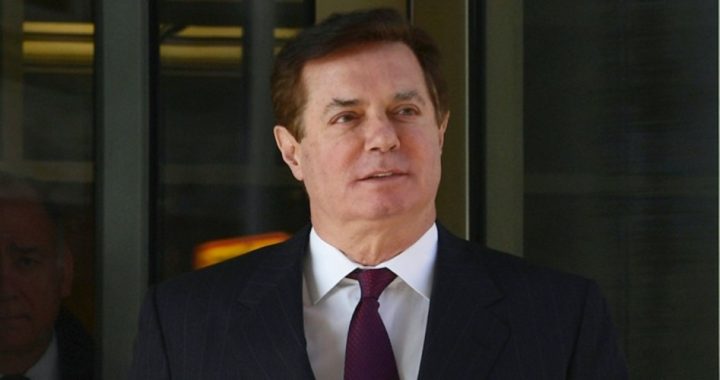
Though described by some as monarchical, President Trump is constitutionally empowered to pardon Paul Manafort (shown).
Unnamed insiders claim that President Donald Trump is likely to ignore the counsel of his attorneys and his closest advisers and issue a presidential pardon to Paul Manafort, his former campaign chairman.
On August 21, a jury in Virginia found Manafort guilty of five counts of tax fraud, two counts of bank fraud, and one count of failure to report foreign bank accounts. The judge in the case declared a mistrial on the other 10 charges faced by Manafort.
Citing comments made by “eight current and former administration officials and outside advisers,” Politico reports that there is a better than even chance that the president exercises his consitutionally delegated power to pardon criminals.
Article II, Section 2 of the U.S. Constitution allows the president “to grant reprieves and pardons for offenses against the United States, except in cases of impeachment.”
These unnamed “advisers,” according to the story in Politico, claim that President Trump is “thrilled by that level of unchecked power” and that he will disregard the advice he’s purportedly received from several sources to stay out of Manafort’s legal situation.
In response to an inquiry made by Politico, White House Press Secretary Sarah Huckabee Sanders referred to a response she gave at a press briefing where she said that pardoning Manafort “is not something that has been up for discussion.” In a written statement made later, Sanders reported that a pardon for Manafort has not been discussed “inside the White House.”
Politico’s coverage of the possibility of a presidential pardon for Manafort seems crafted in a way that would make the issuing of such a pardon some sort of tyrannical act on the part of President Trump. Consider these examples of the editorial bent of the article:
“Trump wants to use his unilateral authority to issue pardons to absolve Manafort.”
“Ever since Trump discovered that he could unilaterally pardon individuals, aides say he’s been thrilled by that level of unchecked power.”
“Pardons allow Trump to act quickly without the constraints imposed by tight voting margins in Congress, or by the judicial system.”
Then there’s this paragraph, where a law professor all but calls Trump a king:
“It is a matter of constitutional law that there is nothing Congress could do to fetter his power to pardon people. He can do it literally with the stroke of a pen, and he can do it any which way he wants to,” said Douglas Berman, a law professor at Ohio State University who specializes in sentencing law and policy. “This is one of the last vestiges of a monarchy — of giving the president this broad clemency power.”
And, this, another quote from another lawyer testifying of Trump’s would-be tyrannical use of the power to pardon:
“He certainly has been much more inclined to use the pardon in a freewheeling and personal fashion, so far, without going through the normal Justice Department process,” said Margaret Love, who served U.S. pardon attorney from 1990 to 1997.
So, what are the constitutional limits of the power of a president to pardon convicted criminals?
Here are the limits as considered and codified by our Founding Fathers in the Constitution.
As stated above, Article II of the U.S. Constitution declares that the president “shall have power to grant reprieves and pardons for offenses against the United States, except in cases of impeachment.”
As with most questions of constitutional construction, the commentary written by those who drafted and debated the Constitution between 1787 and 1789 is persuasive and illuminating.
In The Federalist, No. 69, Alexander Hamilton explores the potential misuse of the proposed power of the executive to pardon all offenses except impeachment.
“A President of the Union, on the other hand, though he may even pardon treason, when prosecuted in the ordinary course of law, could shelter no offender, in any degree, from the effects of impeachment and conviction,” Hamilton writes.
Presumably, “no offender” would include Manafort or even the president himself.
In other words, the president could, Hamilton claims, pardon himself for crimes, even treason or conspiracy to commit treason, though he could not shield himself from impeachment and removal from office.
About 11 days after penning this examination of the pardon power, Hamilton — himself a friend of an executive possessed of nearly unbounded authority — takes up the topic again.
In The Federalist, No. 74, Hamilton writes:
Humanity and good policy conspire to dictate, that the benign prerogative of pardoning should be as little as possible fettered or embarrassed. The criminal code of every country partakes so much of necessary severity, that without an easy access to exceptions in favor of unfortunate guilt, justice would wear a countenance too sanguinary and cruel. As the sense of responsibility is always strongest, in proportion as it is undivided, it may be inferred that a single man would be most ready to attend to the force of those motives which might plead for a mitigation of the rigor of the law, and least apt to yield to considerations which were calculated to shelter a fit object of its vengeance. The reflection that the fate of a fellow-creature depended on his sole fiat, would naturally inspire scrupulousness and caution; the dread of being accused of weakness or connivance, would beget equal circumspection, though of a different kind. On the other hand, as men generally derive confidence from their numbers, they might often encourage each other in an act of obduracy, and might be less sensible to the apprehension of suspicion or censure for an injudicious or affected clemency. On these accounts, one man appears to be a more eligible dispenser of the mercy of government, than a body of men.
Hamilton’s espousal of extreme executive pardon power was contradicted in the philosophy of Italian jurist and philosopher Cesare Becarria. In his An Essay on Crimes and Punishment, Becarria posits the following about the existence of the power to pardon and legitimate reasons for its exercise:
It is indeed one of the noblest prerogatives of the throne, but, at the same time, a tacit disapprobation of the laws. Clemency is a virtue which belongs to the legislator, and not to the executor of the laws; a virtue which ought to shine in the code, and not in private judgment. To shew mankind, that crimes are sometimes pardoned, and that punishment is not the necessary consequence, is to nourish the flattering hope of impunity, and is the cause of their considering every punishment inflicted as an act of injustice and oppression. The prince, in pardoning, gives up the public security in favour [sic] of an individual, and, by his ill-judged benevolence, proclaims a public act of impunity.
There are those who will dismiss Becarria’s opinion, being unfamiliar with the author and his influence. Readers would do well to remember, however, that the research conducted by Professor Donald Lutz on the writers who most influenced the Founding Fathers revealed that Becarria was in the top 10 of that list, ranking just two spots below John Locke!
Closer to home, “Centinel,” the pseudonym of the Pennsylvania anti-federalist Samuel Bryan, warned that the pardon power granted to the president in the proposed constitution would allow the president to “screen from punishment the most treasonable attempts on the liberties of the people.”
Bryan’s fellow Pennsylvanian anti-federalists suggested that the only way to prevent the president from exercising the pardon power to protect his cronies (or himself) would be to have required any such action be subjected to the review of “a small independent council” created specifically to avoid such self-serving clemency.
Anti-federalist admonitions aside, there is no debate that the Constitution establishes only one exception to the pardon power granted in that document to the president: impeachment. Any other crime, therefore, including any crime committed by Paul Manafort, could be constitutionally pardoned by President Trump without straying beyond the boundaries of his legitimate constitutional authority.
Photo of Paul Manafort: AP Images



